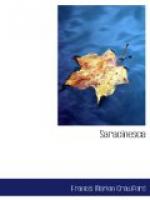“I believe you have no convictions!” she said angrily. “While we are risking our lives and fortunes for the good cause, you sit here in your studio dreaming of barricades and guillotines, merely as subjects for pictures—you even acknowledge that in case we produce a revolution you would go away.”
“Not without finishing this portrait,” returned Anastase, quite unmoved. “It is an exceedingly good likeness; and in case you should ever disappear—you know people sometimes do in revolutions—or if by any unlucky accident your beautiful neck should chance beneath that guillotine you just mentioned,—why, then, this canvas would be the most delightful souvenir of many pleasant mornings, would it not?”
“You are incorrigible,” said Donna Tullia, with a slight laugh. “You cannot be serious for a moment.”
“It is very hard to paint you when your expression changes so often,” replied Anastase, calmly.
“I am not in a good humour for sitting to you this morning. I wish you would amuse me, Del Ferice. You generally can.”
“I thought politics amused you—”
“They interest me. But Gouache’s ideas are detestable.”
“Will you not give us some of your own, Madame?” inquired the painter, stepping back from his canvas to get a better view of his work.
“Oh, mine are very simple,” answered Donna Tullia. “Victor Emmanuel, Garibaldi, and a free press.”
“A combination of monarchy, republicanism, and popular education—not very interesting,” remarked Gouache, still eyeing his picture.
“No; there would be nothing for you to paint, except portraits of the liberators—”
“There is a great deal of that done. I have seen them in every cafe in the north of Italy,” interrupted the artist. “I would like to paint Garibaldi. He has a fine head.”
“I will ask him to sit to you when he comes here.”
“When he comes I shall be here no longer,” answered Gouache. “They will whitewash the Corso, they will make a restaurant of the Colosseum, and they will hoist the Italian flag on the cross of St. Peter’s. Then I will go to Constantinople; there will still be some years before Turkey is modernised.”
“Artists are hopeless people,” said Del Ferice. “They are utterly illogical, and it is impossible to deal with them. If you like old cities, why do you not like old women? Why would you not rather paint Donna Tullia’s old Countess than Donna Tullia herself?”
“That is precisely the opposite case,” replied Anastase, quietly. “The works of man are never so beautiful as when they are falling to decay; the works of God are most beautiful when they are young. You might as well say that because wine improves with age, therefore horses do likewise. The faculty of comparison is lacking in your mind, my dear Del Ferice, as it is generally lacking in the minds of true patriots. Great reforms and great revolutions are generally brought about by people of fierce and desperate convictions, like yours, who go to extreme lengths, and never know when to stop. The quintessence of an artist’s talent is precisely that faculty of comparison, that gift of knowing when the thing he is doing corresponds as nearly as he can make it with the thing he has imagined.”




